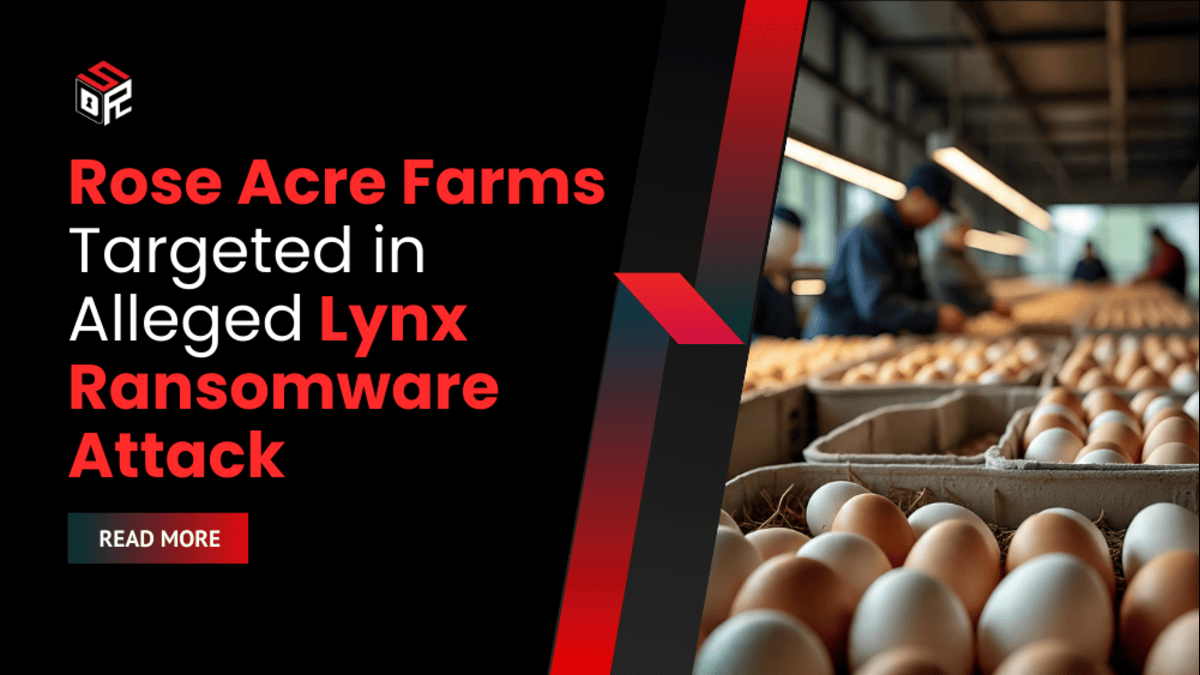Rose Acre Farms, one of America’s largest egg producers, has reportedly fallen victim to a ransomware attack claimed by the cybercrime cartel known as Lynx. The attackers allege they have encrypted company data, a tactic that has previously caused operational chaos, product shortages, and price hikes in the food and agriculture sector.
The breach highlights the ongoing risks ransomware poses to critical industries, particularly food production, where downtime can directly impact consumer markets.
Attackers Claim Data Encryption on Rose Acre Farms Systems
The Lynx ransomware group announced the breach on its dark web leak site, where it lists victims to pressure organizations into paying ransoms. While the cartel did not initially share stolen data samples, it asserted that Rose Acre Farms’ systems were encrypted. Proof of the intrusion, according to Lynx, would be made available later.
Rose Acre Farms, headquartered in Indiana, generates nearly $700 million in revenue annually and employs more than 2,000 staff across multiple U.S. states. Its eggs, once stocked by Walmart, are now more commonly found in Aldi supermarkets. The alleged cyberattack reportedly occurred late last week, with attackers gaining access to the company’s network before deploying encryption malware.
Ransomware Threats to the Food Supply Chain
Cybersecurity researchers emphasize that ransomware attacks are particularly damaging for food producers. Without reliable data backups, companies risk severe disruptions in production and delivery. Perishable goods like eggs spoil quickly, compounding the financial impact of downtime.
As the Cybernews research team explained:
“Such attacks can cause financial losses for the victim, and in this case, may also cause market fluctuations due to decreased supply. Which, in turn, may affect product availability and pricing to end users.”
The consequences can extend beyond company operations into wider market volatility. Previous ransomware incidents demonstrate the potential:
- In 2021, JBS, the world’s largest meat processor, faced a ransomware attack that threatened the U.S. meat supply chain and drove up prices.
- The same year, a ransomware strike on Colonial Pipeline forced a week-long shutdown of America’s largest fuel pipeline, triggering fuel shortages and price hikes across several states.
- More recently, in September 2025, an attack on Jaguar Land Rover forced the automaker to shut down systems, causing “severe disruptions to its retail and production activities.”
Who Is Behind the Lynx Ransomware Cartel?
The Lynx ransomware operation was first observed in mid-2024 and functions as a ransomware-as-a-service (RaaS) model. Under this structure, ransomware developers lease out their malware to affiliates, who then launch attacks against targets. Profits from ransom payments are split between affiliates and the core developers.
The group’s attack methods follow a standard playbook: breach corporate systems, encrypt sensitive data, and threaten to release stolen files unless a ransom is paid. This strategy places significant pressure on companies that rely on time-sensitive production and supply chain operations.
Some cybersecurity researchers suspect Lynx may be a rebrand or offshoot of the well-known INC Ransom group, given operational similarities.
According to Ransomlooker, a dark web monitoring platform, Lynx has listed over 200 victim organizations in the past twelve months, making it one of the more active ransomware operations currently targeting global enterprises.
The alleged breach of Rose Acre Farms underscores the vulnerabilities within the food supply chain to ransomware attacks. Critical producers of agricultural goods face unique risks: rapid product spoilage, slim operating margins, and strong consumer reliance.
If confirmed, the attack could carry consequences not only for Rose Acre Farms but also for U.S. food distribution networks, raising concerns about ransomware’s potential to disrupt essential goods markets.









